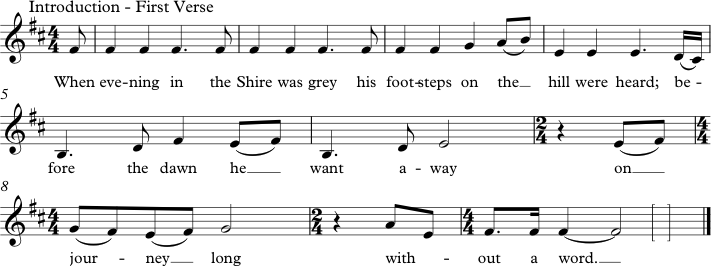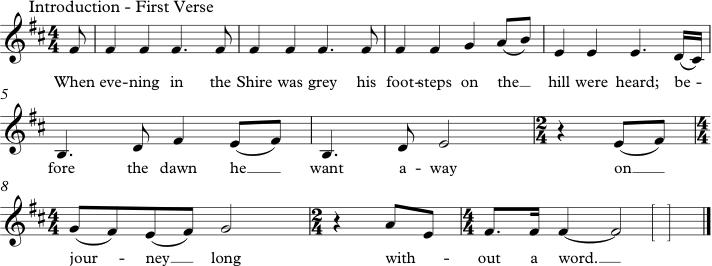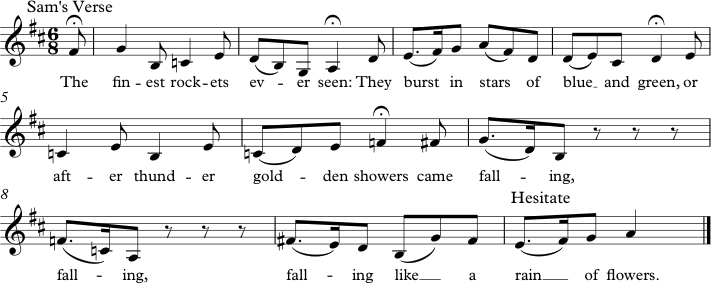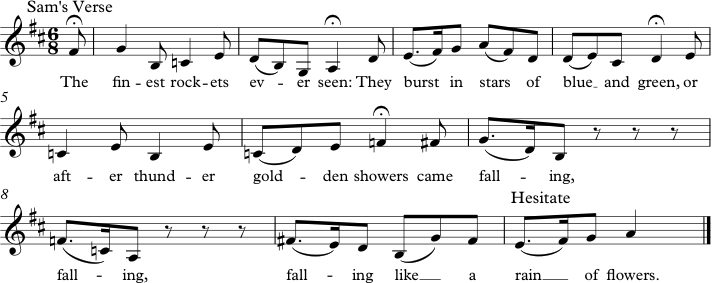Tolkien Ensemble, Frodo’s Lament for Gandalf, TE CD 2, Track 11, 5:47.
After Gandalf seemingly died in the battle with the Balrog, Frodo tried to put his grief into words while at Lothlórien and composed a song about Gandalf. Even though Frodo was not completely satisfied with the result and found it to pale compared to the Elven laments he heard at the time, Sam found it quite apt, but suggested a verse about Gandalf’s fireworks as an addition.
When evening in the Shire was grey
his footsteps on the Hill were heard;
before the dawn he went away
on journey long without a word.
From Wilderland to Western shore,
from northern waste to southern hill,
through dragon-lair and hidden door
and darkling woods he walked at will.
With Dwarf and Hobbit, Elves and Men,
with mortal and immortal folk,
with bird on bough and beast in den,
in their own secret tongues he spoke.
A deadly sword, a healing hand,
a back that bent beneath its load;
a trumpet-voice, a burning brand,
a weary pilgrim on the road.
his footsteps on the Hill were heard;
before the dawn he went away
on journey long without a word.
From Wilderland to Western shore,
from northern waste to southern hill,
through dragon-lair and hidden door
and darkling woods he walked at will.
With Dwarf and Hobbit, Elves and Men,
with mortal and immortal folk,
with bird on bough and beast in den,
in their own secret tongues he spoke.
A deadly sword, a healing hand,
a back that bent beneath its load;
a trumpet-voice, a burning brand,
a weary pilgrim on the road.
A lord of wisdom throned he sat,
swift in anger, quick to laugh;
an old man in a battered hat
who leaned upon a thorny staff.
He stood upon the bridge alone
and Fire and Shadow both defied;
his staff was broken on the stone,
in Khazad-dûm his wisdom died.
[Sam’s verse]
The finest rockets ever seen:
they burst in stars of blue and green,
or after thunder golden showers
came falling like a rain of flowers.
(LotR, 359).
swift in anger, quick to laugh;
an old man in a battered hat
who leaned upon a thorny staff.
He stood upon the bridge alone
and Fire and Shadow both defied;
his staff was broken on the stone,
in Khazad-dûm his wisdom died.
[Sam’s verse]
The finest rockets ever seen:
they burst in stars of blue and green,
or after thunder golden showers
came falling like a rain of flowers.
(LotR, 359).
This is one of the rare examples of songs composed during the journey and clearly written and performed for the culture of the writer himself. Since Frodo spoke Westron as his mother tongue, the English version present in the book is as near as we can possibly get to the original. The song was no translation and it did not need to be accessible to any outside party. We can therefore assume that the style of the song was Frodo’s personal way of composing, of course heavily influenced by the general features of Hobbit music. Likewise Sam’s verse clearly is his own work, visible not only in content, but also in using a different rhyme scheme. Frodo describes the Gandalf he knew – a battered old man, a bit weird, usually very kind, but who could be angered quite easily which made his true power briefly visible. It is unlikely that Frodo had any idea who Gandalf actually was, so the song can be seen as his personal memory of “the wizard”. Sam of course was most impressed by the fireworks, a trademark of Gandalf in the Shire, so it is not surprising that he wrote a verse about Gandalf’s fireworks.
transcription (First Verse): Frodo’s Lament for Gandalf, TE CD 2, Track 11, from 0:40.
As for the style of the song, the version by the Tolkien Ensemble should come very close to a Hobbit lament: The instrumentation is identical to the Hobbit folk songs written by the ensemble; even a mandolin is included. The song is slow and sad, as fitting to a lament, but it nevertheless keeps the optimism inborn to Hobbits. Frodo in a very simple manner recalls “his” Gandalf, as does Sam. The song, though not accompanied in the book, maybe was given an accompaniment later by Frodo when he wrote it down in the Red Book. It would then be this version that is presented by the Tolkien Ensemble. The lament starts with a solo violin, beginning over a low double bass drone. The accordion comes in with long notes at 0:24, taking over from the basses, and the guitar plucks arpeggiated chords while Frodo sings the first stanza (0:40). After a brief interlude (1:08), and the similar second stanza, the third stanza begins quite cheerfully (1:44), following typical Hobbit nature, and then goes back to the former style. The last two stanzas by Frodo are structured identically, with Gandalf’s battle with the Balrog again being more cheerful, emphasizing the courage of the wizard, rather than his apparent failure.
transcription (Last Verse): Frodo’s Lament for Gandalf, TE CD 2, Track 11, from 4:27.
http://soundcloud.com/middle-earth-music/4-1-8-frodos-lament-for/s-tJ4ZR
Sam’s stanza (4:23) goes back to the Hobbit folk style used in the Walking Song and other renditions by the Ensemble, but at the end again returns to the violin intro from the beginning of the piece. Frodo in the piece, influenced by Elvish music, creates a lament that is sad, mourning the death of his comrade and friend, yet at the same time keeps the optimism that is inborn to any Hobbit, it seems. The rendition by the Ensemble does this justice.




